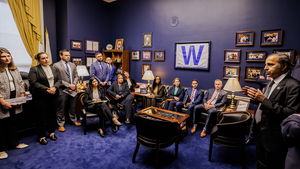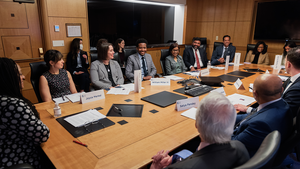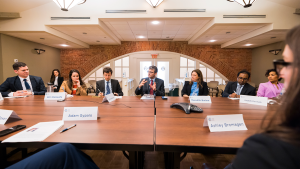Search Results
1 – 10 of 2,031 search results for Emerging Leaders
-

Emerging Leaders Program Information Session - May 2025
Globally minded Chicago-area professionals, ages 30 to 45, are invited to learn more about the Emerging Leaders Program and the benefits to their professional and personal growth. -

Emerging Leaders Program Information Session - August 2025
Globally minded Chicago-area professionals, ages 30 to 45, are invited to learn more about the Emerging Leaders Program and the benefits to their professional and personal growth. -

Emerging Leaders Program Information Session - July 2025
Globally minded Chicago-area professionals, ages 30 to 45, are invited to learn more about the Emerging Leaders Program and the benefits to their professional and personal growth. -

Emerging Leaders Information Session for Prospective Applicants
Globally minded Chicago-area professionals, ages 35 to 45, are invited to learn more about the Emerging Leaders Program and the benefits to their professional and personal growth. -

Emerging Leaders Information Session for Talent Officers
Talent and human resources officers are invited to learn more about the Emerging Leaders Program and the benefits to their companies and organizations. -
Emerging Leaders Community
The Emerging Leaders community consists of a wide variety of global leaders from across the business, civic, and academic sectors
-

A Toast to the Emerging Leaders Program
The EL Alumni Recruitment Committee hosted a virtual wine tasting and networking event for the Emerging Leaders community. -
Emerging Leaders Program
Enhance your network by joining the Council’s premier community of visionary leaders from diverse sectors across Chicago, united by their global outlook and commitment to local action.
-
Emerging Leaders Directory
Amrith Aakre , Director, US Equal Employment Opportunity Commission, Cohort, 2018, Industry, Law, sector, Public Sector, Previously, Amrith Kaur Aakre was the legal director of the Sikh Coalition, where she coordinated legal and policy initiatives to protect the civil rights of all Americans, cr...
-

Emerging Leaders Program Information Session - July 2024
Globally minded Chicago-area professionals, ages 35 to 45, are invited to learn more about the EL Program and the benefits to their professional and personal growth during this info session.